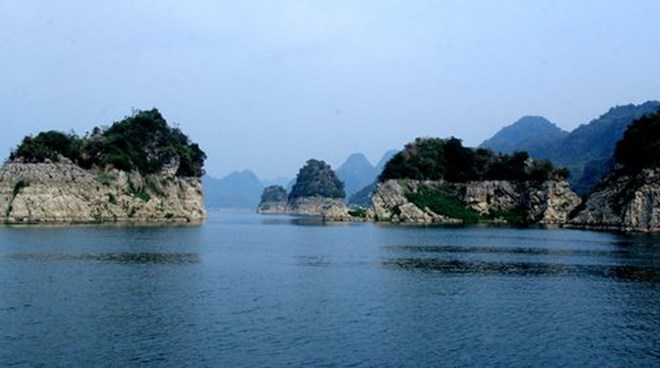
A fact-finding trip was organised to explore potential for tourism development in mountainous Lung Van commune in the northern province of Hoa Binh’s Tan Lac district.
Hoa Binh
Lake - a tourist attration in Hoa Binh
province (Source: VNA)
The trip was joined by local officials,
representatives from Action on Poverty in Vietnam, and FLC Group on August 8.
Situated at an altitude of nearly 700m above sea level, and covered with clouds
around the year, Lung Van is the centre of five upland communes of Tan Lac
district. It has great potential and advantages for promoting tourism
development.
It boasts numerous heritage featuring Muong ethnic people’s culture identities
such as Mo Muong culture heritage, Muong gong, handicraft products, traditional
festivals and folk games.
Lung Van is an attractive destination for community-based tours. It has the
provincial road 440 linking to localities with tourism potential including
communes of Quyet Chien, Nam Son, Bac Son, Ngo Luong in Tan Lac district;
Pu Bin and Noong Luong communes in Mai Chau district; and tourism sites in Bac
Thuoc district of the north central province
of Thanh Hoa.
Besides, Lung Van boasts a system of caves and old stilt houses.
During the trip, participants visited several projects of tourism development.
Representatives from FLC hoped to cooperate with the locality in developing
tourism, especially community-based tourism, while calling on the local
authority to work well on management, and pay attention to improving the
quality of tourism services.
Training courses should be arranged for local households which are supplying
homestay services for tourists, helping them collect experience in this field,
they said.
Action on Poverty in Vietnam
pledged to send experts to Lung Van to support the building of tourism
development plans for the locality.
Speaking at the working session with the delegation, Vice Secretary of the
provincial Party Committee and Chairman of the provincial People’s Council Tran
Dang Ninh asked Tan Lac authority to swiftly outline a project to promote
tourism development in upland communes, focusing on encouraging local household
to provide homestay services.
Tourism activities must ensure the preservation of typical culture and
environmental protection, he noted.
Source: VNA
Located just a 20-minute drive from Hoa Binh City, Ora Hill Farmstay & Glamping Hoa Binh is a captivating new destination nestled in Mo hamlet, Bình Thanh commune, Cao Phong district. Combining farming with leisure, this tranquil retreat is perfect for those seeking balance, joy, and an immersive experience in the expansive beauty of nature.
Muong Bi - Tan Lac is renowned as one of the four famous Muong regions in Hoa Binh province. Blessed by nature with a favourable climate and stunning landscapes, Tan Lac holds great advantages for tourism development. The local tourism industry has made remarkable strides in recent times thanks to the attention and support from the local authorities and sectors.
With its strategic location, well-developed transport network, and diverse soil and climatic conditions, Hoa Binh is emerging as a must-visit destination in Vietnam's northwestern tourism corridor. The province boasts numerous attractions, including the Kim Boi hot springs (Kim Boi district), the Dau Rong cave complex (Cao Phong), the Mai Chau valley (Mai Chau), and the iconic Hoa Binh hydropower plant.
The northern mountainous province of Hoa Binh has been listed among the 71 most beautiful places to visit worldwide by the prestigious US travel magazine Condé Nast Traveller.
Hoa Binh province’s rich natural and cultural resources position it as a prime location for developing community-based tourism (CBT). In recent years, support from central and provincial policies, as well as assistance from non-governmental organisations, have encouraged local ethnic minority and mountainous communities to actively engage in the sector.


